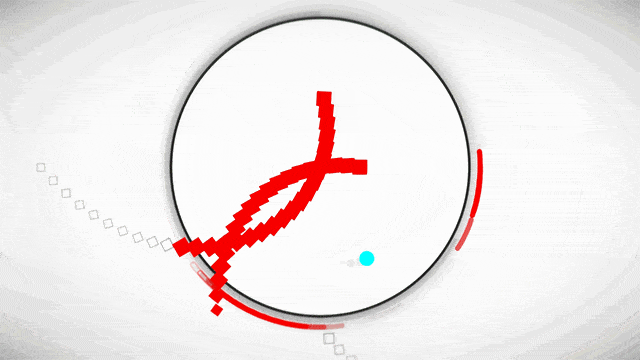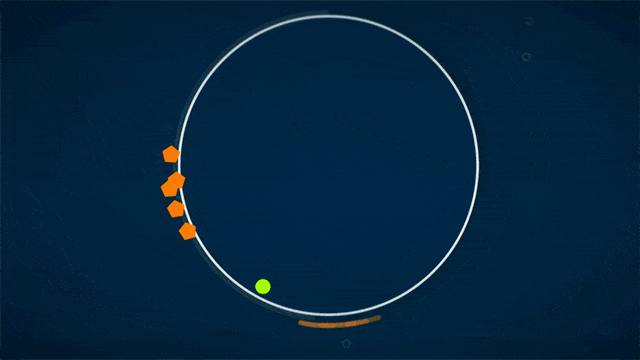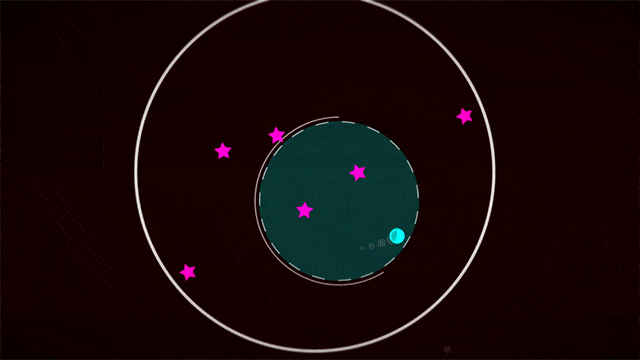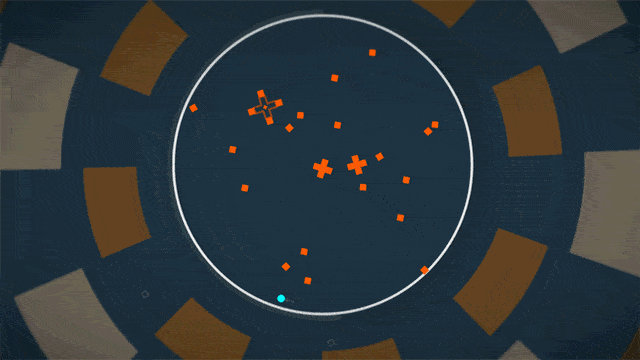HyperDot enemy types and how to outsmart them
HyperDot is a fast-paced arcade game with one rule: dodge everything. The player avatar is a dot and the goal is to navigate safely through a sea of enemy shapes. There are only five enemy types, and these building blocks can be tweaked and layered with modifiers (e.g. “player slow” or “arena icy”) to create infinite challenges.
Charles McGregor is HyperDot’s solo developer. I cornered him and made him take me through the origins, behaviors, and dodging tips for HyperDot’s five enemy types.

Squares
The firstborn, the most familiar.
Enemy behavior
“Squares go in a straight line. They’re the most basic enemy and easiest to understand,” Charles says. “They’re the first enemies I ever made in HyperDot and the backbone of the game.”
Dodger beware
Squares are underestimated. Once players get to know trickier enemy types, they put their focus on dodging them…and get caught by those simple, common squares.
How to use them in the level editor
Squares are the best enemy type to form “structures” when creating your own levels — that is, solid lines of red that players need to navigate around.

Pentagons
Pentagons were the second enemy created for HyperDot. With just squares, a player could pick a spot in the level and stay relatively still while the enemies sailed past them. Pentagons have a little more ambition.
Enemy behavior
As Pentagons spawn, they point at the player dot, then move straight across the arena. Charles explains, “Under the hood, I basically just say hey, pentagon? Rotate once towards the player. Then that’s it.”
In the prototype, they were hexagons
“I changed the hexagons to pentagons because pentagons have a point that indicates the direction they’re heading in,” Charles says. Don’t say he never did anything for you.
Players don’t “get” them
Without the above info on hand, players can tell that pentagons are doing something different but they’re not sure what. Charles drops hints for these and other enemies in the names of the single player levels — keep that in mind.

Triangles
Triangles are Charles’ third enemy and probably the most despised shape in HyperDot. Together with squares and hexagons, these three shapes were the enemies in the original game prototype. After hexagons became pentagons, the enemies’ shapes, colors, and behaviors have remained largely unchanged through three years of development.
Enemy behavior
Triangles act like homing missiles — they follow player dots around the arena, much to most players’ distress.
Under the hood
Like the pentagons, triangles are programmed to rotate. Unlike the pentagons, they keep rotating — they’ll follow the player around for five seconds until moving off the arena.
The enemy of your enemy
You can attract and pass triangles off to other players in multiplayer. Not condoning it, just saying it’s possible.

Stars
Something dastardly that takes its inspiration from something pure.
Enemy behavior
Like triangles, stars follow player dots. But instead of swinging around in a wide circle, they spin in one spot and shoot straight at the player again. And again. And again.
GameCube roots
“Stars were actually inspired by Kirby Air Ride. There is a star in the game called the Swerve Star. Basically, you stop, adjust where you’re pointing, and then go. Then stop, adjust where you’re pointing, and then go. I thought, ‘oh, what if an enemy did that?’” Charles says.
You’ll see more of them later
Stars are tricky, and they crop up often in difficult late-game levels. By staggering their spawn times just so, just a handful of stars in an arena can feel like a constant barrage of attacks.

Crosses
Complex and chaotic.
Enemy behavior
Crosses enter the arena, come to a stop, spin on their axes, then break into four small squares that shoot quickly across the arena.
Why, though
“I wanted to have a more random enemy, one that was based more off twitch reflexes than pattern recognition. Crosses get the most flak from a lot of like game designers.”
If you pay close attention
As they spawn, the crosses indicate which direction they’re going to split apart in. When they spin, they stop in the same orientation they were in before, then break apart.
Get HyperDot
HyperDot
Dodge Everything
| Status | Released |
| Publisher | |
| Authors | GLITCH, Tribe Games |
| Genre | Action |
| Tags | Abstract, Arcade, Minimalist |
| Languages | English |
| Accessibility | Color-blind friendly, High-contrast, One button |
More posts
- HyperDot is coming to Switch and PlayStation this Fall!Jun 12, 2021
- Patch Notes, June 18, 2020Jun 18, 2020
- Patch Notes, May 28, 2020Jun 08, 2020
- Gauntlet UpdateMay 18, 2020
- Patch Notes, Apr. 8, 2020Apr 08, 2020
- Patch notes, Feb. 19, 2020Feb 19, 2020
- HyperDot is available now!Jan 31, 2020
- HyperDot Release Date!Jan 07, 2020

Leave a comment
Log in with itch.io to leave a comment.